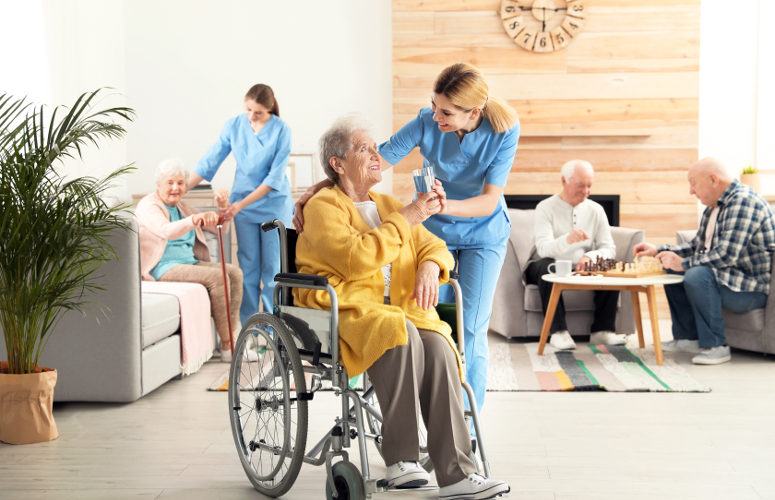
Murphy Signs New Affordable Housing Legislation
On Mar 20, 2024Gov. Phil Murphy today signed affordable housing legislation to support towns in meeting their affordable housing obligations. The legislation develops a new system for municipalities to meet their Mount Laurel affordable housing obligations, replacing the current process that exists entirely in the courts.
“One of our administration’s top priorities has been to establish New Jersey as a national leader in expanding affordable housing,” said Murphy. “With today’s bill signing, we will be able to create more certainty and lower costs in New Jersey’s affordable housing landscape. By establishing new processes and practices for towns to meet their Mount Laurel affordable housing obligations, we are able to more quickly and efficiently allocate funding to municipalities and support those building affordable housing in our state. I am proud that my administration and the Legislature have enacted a coherent and workable framework that no longer leaves this issue exclusively to the courts.”
The primary bill, A-4/S-50 (Lopez, Coughlin, Wimberly, Reynolds-Jackson/Singleton, Scutari, Ruiz), establishes a new, streamlined framework for determining and enforcing municipalities’ affordable housing obligations under the New Jersey Supreme Court’s Mount Laurel doctrine and the state’s Fair Housing Act. Starting with the compliance period that begins in 2025, the Department of Community Affairs will publish non-binding calculations of municipalities’ current and prospective need for affordable housing using a formula based on prior court decisions. Disputes about municipalities’ affordable housing obligations and plans to meet those obligations will be resolved on an expedited basis by the Judiciary with assistance from a new dispute resolution program.
This process will replace the role previously played by the Council on Affordable Housing (COAH), which has been defunct for over a decade and is formally abolished under this bill. The new process will streamline compliance and reduce litigation-related delays to the construction of new affordable housing and will give municipalities and developers more certainty, which will enable smarter planning around where housing should be built.
As part of this process, the bill contains provisions outlining how municipalities may receive “bonus credits” that allows units of affordable housing to be credited as 1.5 or 2 units in certain circumstances. This bonus credit system incentivizes age-restricted housing, housing set aside for individuals with special needs, and other location or purpose-specific housing projects, such as housing near mass transit stations. The bill caps the use of bonus credit units at 25% of a municipality’s prospective need obligations and establishes related parameters for how much of a municipality’s obligations must be satisfied through housing available to families with children and through rental housing.
Additional bills signed today include:
- ACS for A-2267/SCS for S-1415 (Lopez, Quijano/Singleton, Stack), which requires the New Jersey Housing Mortgage and Finance Agency to establish a pilot program to support insurance premiums for eligible affordable housing projects constructed by for-profit affordable housing developers.
- S-1422/A-3365 (Singleton, Turner/Lopez, Speight, Calabrese), which allows taxpayers to accelerate depreciation of eligible property expenditures in connection with construction of new affordable housing developments in order to realize cost savings.
- A-2296/S-2309 (Lopez, Wimberly/McKnight, Stack), which allows a municipal governing body to delegate to the municipal clerk the authority to issue certain approvals to facilitate development of affordable housing projects.
- A-3337/S-2312 (Wimberly, Reynolds-Jackson, Quijano/Stack, Singleton), which permits “payment in lieu of taxation” (PILOT) agreements between municipalities and affordable housing projects that receive funding through the State Affordable Housing Trust Fund or municipal affordable housing trust funds.
- A-1495/S-1484 (Karabinchak, Lopez, Swain/Lagana, Diegnan), which exempts receipts from sales made to contractors or repairmen of materials, supplies, or services related to the construction of 100%-affordable housing projects in order to help reduce costs for the construction of such projects.
“Affordability has been the cornerstone of the efforts we have taken in the Legislature to address the challenges our residents face every day,” said Senate President Nicholas Scutari. “This initiative will allow us to develop additional affordable housing in New Jersey and make the system more workable. These bills make real progress in making housing more accessible and affordable for residents in communities throughout the state.”
“At this critical juncture in New Jersey, with soaring housing prices and limited housing stock, this legislation is essential,” said Senate Majority Leader M. Teresa Ruiz. “It will expedite the construction of affordable housing near transit hubs, generating more jobs. Furthermore, by streamlining the process for municipalities with clear guidance and deadlines, we aim to make fulfilling affordable housing obligations less daunting while effectively addressing the state’s affordable housing shortage.”
To access more business news, visit NJB News Now.
Related Articles:





